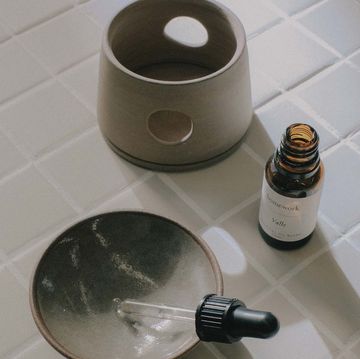They’ve become commonplace in the Insta wellness community, with fitness influencers and celebrities alike promoting their so-called slimming properties. But the ever-growing trend for ‘detox’ products has a sinister side, and while they sometimes make your stomach look a little flatter for a couple of hours, their long-term health effects are questionable.
The problem is that many of these products (which usually come in innocuous, lifestyle-friendly packaging) contain laxatives and diuretics.
Laxatives (that cause your bowels to open) or diuretics (that make you urinate excessively), are a rather more drastic form of detoxing than many people knowingly sign up for - you might not even spot them lurking covertly in your health tea's ingredients list - and if used too frequently or incorrectly, could lure you into seriously unhealthy, disordered eating.
The use of laxatives as part of eating disorders is common. It's such a problem, in fact, that the UK government last year announced a review by the Medicines and Healthcare Products Regulatory Agency, to assess how the medicines are sold, and whether we need tighter restrictions.
Products sold for ‘detoxing’ - teas, shakes, juices, pills and powders - offer up a variety of claims, from ridding the body of toxins, (your liver’s regular day job), to reducing bloating and flattening the stomach (by causing your bowels to empty, or causing you to wee out all your hydration), and boosting your energy levels (with drugs that act as stimulants).
Many such products blithely normalise the use of laxatives as part of everyday ‘wellness’, hiding behind words like ‘cleanse’ (rather than ‘poop’), and using celebrities to endorse them.
Dr Joan Brunton from the Royal College of Psychiatrists is concerned by the normalisation of medical ingredients such as laxatives, in commercial products.
'The fact that these products – laxatives, "detox teas" and the like – are readily available on supermarket shelves normalises them and doesn’t speak to the seriousness of these drugs.'
'We know that more than half of those who suffer from eating disorders use laxatives. We would welcome restrictions of products that are known to cause serious harm to some of the people who use them.'
Earlier this year, the NHS called for the likes of Instagram, Facebook and Twitter to stop allowing celebrity endorsements of products such as diet pills, detox teas and appetite-suppressing sweets.
Professor Steve Powis said: 'Highly influential celebrities are letting down the very people who look up to them by peddling products which are at best ineffective and at worst harmful.'
Why is laxative abuse so bad?
Used to excess, laxatives can irritate the digestive system, cause diarrhoea, and stomach cramps, and prevent your body from absorbing nutrients from your food.
Long term, they can affect the way your bowels work, making them lazy and leading to a reliance on them just to go to the toilet as normal. They can also reduce the effectiveness of the Pill.
Are all detox teas potentially harmful?
No, not all ‘detox’, ‘cleanse’ and ‘skinny’ products are harmful, so we spoke to Nutritionist Resource Expert Sonal Shah to sort out what to look for if you want to help your body detox in a healthy way, and what ingredients to steer clear of.
'I would be very dubious of any marketing that claims genuine weight loss from products like these,' she warns. 'Some of the products may induce laxative actions and this may leave one feeling lighter and less bloated, which leads to a slimmer waistband - temporarily.
'Often with quick fixes, the weight loss is water weight first and then muscle mass can also be lost. For long-term weight loss, the focus should be about lowering body fat percentage and teas and shakes on their own cannot achieve this. Exercise, balanced eating, sleep and stress management all need to be considered.'
If you find a detox-style product helpful in getting you on to the right track, be a detective about what ingredients are in it and how they work.
What are the ingredients to watch out for?
The main ingredient to watch for is Senna, a natural leaf with strong laxative properties.
'I would only recommend Senna as a short-term remedy for constipation, if nothing else has worked,' says Sonal.
She also advises to be careful about artificial sweeteners, flavouring and colours, which can have laxative side effects, and to look up any ingredients you don’t recognise and check their properties.
Importantly, ‘natural’ doesn’t mean harmless. Natural ingredients can have strong laxative effects on the body (such as Senna).
Other ingredients you may see include Satiereal and Super Citrimax, which are found in so-called slimming products promoted by celebs including the Kardashians, but are not approved by the FDA (Food and Drug Association in the US).
And be wary of fibrous bulking agents such as agar, psyllium husk and methylcellulose, which work with water to give a laxative effect - and can lead to chronic constipation if overused.
Stimulants such as caffeine, guarana and ma huang can also be problematic, as they artificially speed up the metabolism and can make you feel dizzy and faint.
How can I detox naturally?
To give your body a safe helping hand, Sonal suggests: 'Water and herbal teas like lemon, green tea, nettle, ginger, dandelion, are fine to drink, and adding foods such as grapefruit, artichoke, asparagus, apples, nuts, as well as seeds like flax and chia to your diet will really help you on your way to feeling naturally healthy, full of energy and with all your body’s systems working in harmony.'
Ultimately, if it sounds (and looks) too good to be true, it probably is.
















